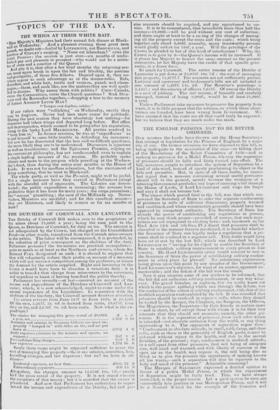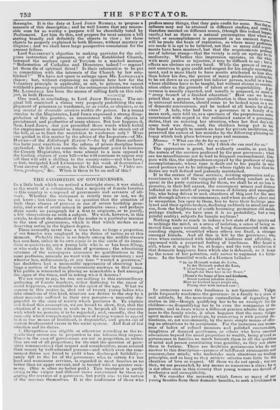THE ENGLISH PRISONS NOT TO BE BETTER ORDE RED.
OUR masters the Lords have thrown out the Home Secretary's first attempt at legislation for the Prisons of England, by a majo- rity of one. On former occasions we have objected to this bill, as beiug inadequate to the necessities of the case—as falling short of the Resolutions of the Select Committee of 1836—and as making no provision for a Model Prison, wherein the separation of prisoners should be fully and fairly carried into effect. The bill, moreover, sought to introduce the system of Separation by a kind of side-wind, instead of openly proclaiming its object in the title and preamble. But, in spite of all these faults, we cannot but regret that a measure containing several useful provisions should fall to the wound, merely because the weakness of a
tottering Government precludes any hope of carrying a bill through
the House Of Lords, if Lord LYNDHURST Only wags his finger
and says it shall not become law.
The clause which proved fatal to the hill, was that which em- powered the Secretary of State to order the separate confinement of prisoners in cells of sufficient dimensions, properly warmed and ventilated, and whose construction generally should have beca approved by competent authority. The Secretary of State has already the power of establishing any regulations in prisons. which he may think proper—provided, of course, that such regu- lations are not repugnant to existing laws : and, inasmuch as the Gaol Acts (4th and 5th Geo. IV.) direct that prisoners shall he classified in the manner therein mentioned, it is doubtful whether the Secretary of State can legally make a regulation that a pri- soner shall be confined in a separate cell. This doubt would have been set at rest by the lust bill ; which was described by Lord. LYNDHURST as a having for its object to enable the Secretary of State to establish solitary imprisonment in every prison in this country. He (Lord LYNDHURST) never would consent to Vest ma the Secretary of State the power of establishing solitary confine-. ment in every place he pleased." No satisfactory explanatioa being given upon this point by any member of the Government, Lord LYNDHURST'S objection, for want of an answer, appeared uo- answerable ; and the defeat of the bill was the result.
Now it may surprise some of our readers to be informed, that the bill did not authorize solitary confinement, in any way what- ever. The grand blunder, or sophism, (far we really know not which is the proper epithet.) which ran through the debate, was the confusion of the notion of solitary confinement, with that of the modified separation contemplated by the bill. It was intended that prisoners should be confined in separa'e cells, where they should be visited by the Keeper, the Chaplain, the Surgeon, the Officers, the Magistrates, the Inspectors—by their friends in certain cases —and in short, by all except those with whom it is for their best interests that they should not associate, namely, the other pri- soners. It is the separation of prisoners from each other which is intended—not absolute seclusion from the world, or any thing approaching to it. The opponents of separation argue thus :
" Confinement in absolute solitude, in small, cold, damp, and close cells, such as those in the generality of English gaols, ciamot lie enferced without injury to the health, and risk to the mental
faculties, of the prisoner; ergo, confinement in modilled solitude, in a cell apart from other prisoners, Unit cell being of adequate
size, well aired and warmed, and with liberty of exercise its the open air as the health may require it, the cell being also so fitted as to give the prisoner the opportunity of making known all his wants,—such a separation will also be injurious to the body and mind of the prisoner." Admirable reasoning !
The Marquis of SALISBURY expressed a decided opinion in favour of a public Model Prison, in which the experiment
of Separation might be fairly tried. This, we have always contended, is the proper course. Let a goad system be once put successfully into practice in our Metropolitan Prison, and it will be a Normal School for the example of the Counties and Boroughs. It is the duty et Lord JOHN RUSSELL to 'propose a measure of this description ; and he well knows that any reason- able sum for so worthy a purpose will be cheerfully voted by Parliament. Let him do this, and prepare for next session a bill stating broadly and definitely the objects in view ; let those objects be properly explained to both Houses, without mystery or disguise ; and we shall have large prospective consolation for the present failure. Lord SALISBURY'S objection to making provision for the reli- gious instruction of prisoners, not of the Established Church, betrayed the unclean spirit of Toryism in a marked manner. "Reformation of Catholics and Dissenters indeed I— rogues let them die of spiritual thirst! Is their reformation to be put in competition with the interests of the Church by law esta- blished ?" We have not space to enlarge upon Mr. LANGDALE'S clause; but, without expressing an opinion here how far the Voluntary principle is applicable, or not, to prisons, we cannot withhold a passing reprobation of the outrageous intolerance which Mr. LANGDALE has been the means of calling forth on this sub-
ject, in both Houses. %co:so-4'41 One word, in concluding, to Lord intim Russittr.. The ori- ginal bill contained a clause very properly prohibiting the em- ployment of prisoners as wardsmen, or as cooks, or cleaners, or in any menial or domestic services within the prison. In a recent circular to the Magistrates, Lord JOHN expressed a strong disap- probation of this practice, as inconsistent with the objects of punishment, and productive of many abuses. But how happens it, then, Lord JOHN, ',bat you permitted those words which forbid the employment in menial or domestic services to be struck out of the bill, so as to limit the restriction to wardsmen only ? Were you guided in this matter by the advice of the Inspectors—of Mr. HAWKS—of the Edinburgh Review ?—for by all these authori- ties have your exertions for the reform of prison discipline been applauded. Or did you concede this important point to humour the County Magistrates, who were almost to a man opposed to the leading clauses of your bill—who will continue to oppose any bill that will add a shilling to the county-rates—and who have, in fact, instigated Lord LYNDHURST to his work of destruction ? Your answer will, of course, be the Cabinet motto, " Video me. ;7ora, proboque," &c. When is there to be an end of this ?



























 Previous page
Previous page